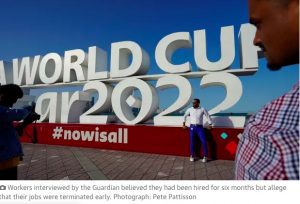Worse was to come: after attempting to dispute the early termination of their contracts, the two men were allegedly detained and deported along with hundreds of others.
“They say it was the most beautiful World Cup, but at the end of the day we just lost everything,” said Patrick.
In the months leading up to the World Cup, Stark Security took on hundreds of security guards to be deployed at key tournament sites. “Because it was Fifa, we all said ‘let’s join’,” said another worker from Ghana.
The Guardian interviewed nine security guards who worked for the company, including Jacob and Patrick, all of whom had their employment terminated early. Four were allegedly later deported and five others were fired at the same time or shortly afterwards but were not deported.
The workers’ contracts, seen by the Guardian, promised a monthly salary of 2,700 riyals (£600) for working seven days a week, as well as providing them with food and accommodation.
The nine workers interviewed by the Guardian all believed they had been employed for six months. Their contracts stated: “Notice period: six months post date of joining.” Under reforms made to Qatar’s labour laws in 2020, employers and workers can end contracts early, but they must give one month’s notice.
“We went to Qatar to earn money and make a better life for our family, but the company and authorities cheated us,” said another fired security guard from Pakistan. “We felt so helpless.”
With nowhere else to stay, no way to repay the huge debts they had taken on to get to Qatar and few other jobs available once the World Cup had finished, Jacob, Patrick and hundreds of other security guards attempted to negotiate with Stark Security and filed a complaint with the Qatari government.
“We told them: we’re still willing to work,” said Jacob. “We have not failed you in any way, we have not committed any crime; if you wish to stop [employing] us, you have to compensate us for these three remaining months.”
But Stark Security told them that there was no more work as the tournament was over, and, according to the workers, ordered the labour camp to stop serving food to them. “They kept coming to the accommodation and threatening us, banging on our door so we would leave,” said Jacob.
On 23 January, about 200 of the guards hired buses to take them to the headquarters of a company associated with Stark Security to negotiate for their unpaid wages. Staff allegedly called the police and claimed the workers were blocking the road. The guards said, apart from their leaders, they did not even get off the buses.
The workers were allegedly taken to a detention centre by the police, with more than 200 later deported, including the four men interviewed by the Guardian, who had been on the buses.
Eventually, with no other options, the men interviewed by the Guardian accepted their wages for the days they had worked in December. Any hope they might be paid for the remaining months of their contract was lost. They said that they, along with all the other men detained with them, were deported within a week. Only Shakir Ullah and his two colleagues remained.
Equidem said it had interviewed 43 men who had worked for Stark Security and allegedly had their contracts terminated early and been deported.
For those who say they were forced to return home, the sense of outrage and shock is still raw. Some blame the Qatari regime. “Nothing happens without its knowledge. We should have gotten our rights if the Qatar government had cared,” said Jacob.
But that anger is also directed at Fifa, which made $7.5bn (£6bn) over the four years leading up to the Qatar World Cup. “Fifa made big money from the World Cup and we deserve our share,” said a guard from Ghana.
A spokesperson for Qatar government’s international media office said an investigation found that Stark Security had failed to comply with all of Qatar’s labour laws and would be penalised.
It confirmed the workers had been employed on temporary six-month contracts, but “a resolution was swiftly reached between the company and its employees, whereby the workers were remunerated in full for their services and their contracts were concluded in accordance with their specified terms”.
It did not confirm if any of the workers had been deported, but said: “Qatar does not arrest or deport workers for seeking to resolve their employment disputes. The rights of all individuals working in Qatar are upheld and protected through the fair and just application of legal due process.”
Fifa directed the Guardian to an earlier statement it made on the case, in which it said it “seeks to facilitate discussions at host country level, to explore available options for remedy”.
Stark Security Services did not respond to requests for comment. Qatar’s local World Cup organising committee declined to comment.
* Names have been changed to protect individuals’ identities.

